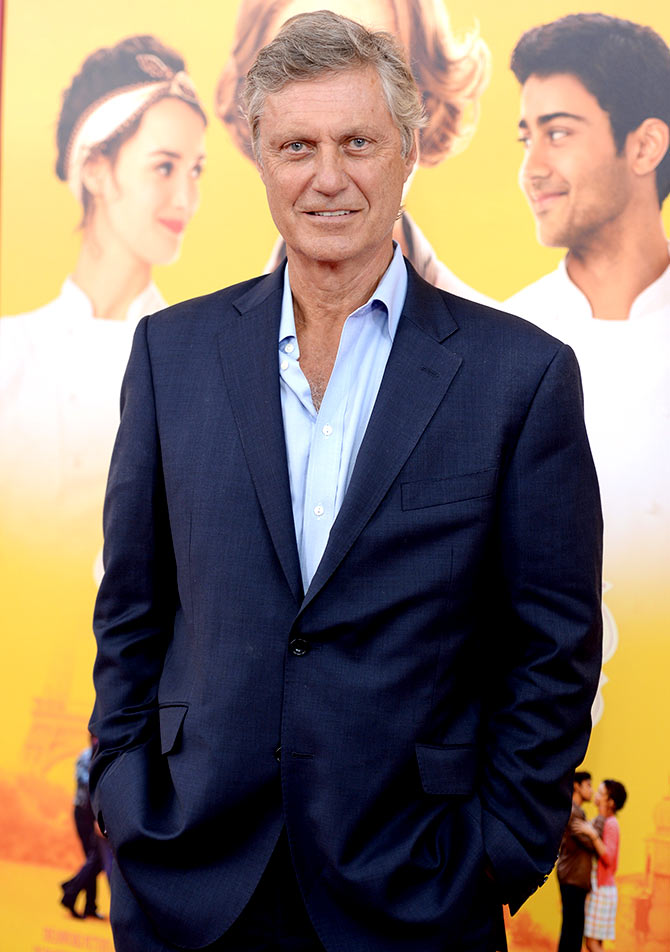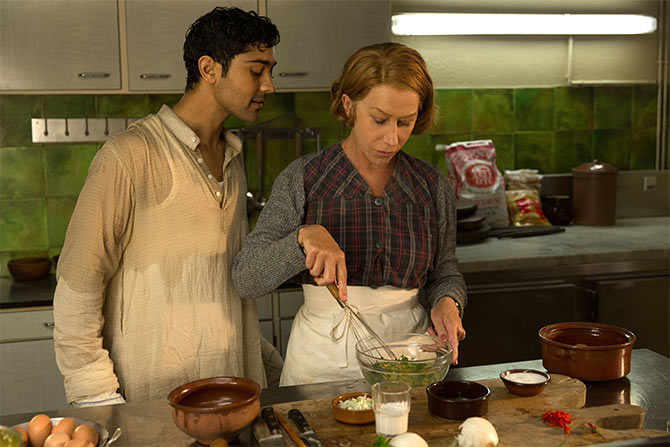Photographs: Dimitrios Kambouris/Getty Images Aseem Chhabra/Rediff.com in New York
'I just love the man. Not only he's a fantastic actor with a presence in whatever he does, but he's also a very soulful, gregarious, generous man with the biggest heart in the business.' Director Lasse Hallstrom tells Aseem Chhabra/Rediff.com about the joys of working with Om Puri on The Hundred-Foot Journey.
Lasse Hallstrom is an Oscar-nominated Swedish filmmaker best known for his whimsical comedies and drama -- Chocolat, What's Eating Gilbert Grape and Cider House Rules.
He has often explored issues related to the clash of diverse cultures. His recent film Salmon Fishing In The Yemen, did just that -- a British fisheries expert explores bringing fly fishing to the Arab country.
His new film The Hundred-Foot Journey, based on Richard C Morais' best-selling novel, is produced by two of Hollywood's biggest names -- Oprah Winfrey and Steven Spielberg. It stars Helen Mirren and Om Puri as two people from diverse cultural backgrounds who compete for the limited food space in a small French village.
There is fun, comedy and a lot of Indian and French food, along with a charming supporting cast, including Manish Dayal and Charlotte Le Bon.
What did you know about Indian cuisine before this film? Had you eaten good Indian food?
I wasn't a regular with Indian food, but I would eat Indian food occasionally when I wasn't a vegan. I would eat all kinds of interesting chicken dishes and desserts. Now that I've been vegan for three years, it's been more limited.
As a vegan, your choices are limited, but whenever I want the taste of spices, Indian food still has options. Somehow I go to Indian restaurants much more often than I used to. Mostly because I made the movie and I got to learn more about Indian food.
...
'It was hard to make the Indian food look good'
Image: Director Lasse Hallstrom with Om Puri and the crew of The Hundred-Foot Journey.Aseem Chhabra/Rediff.com in New York
Was Indian food served during the shoot?
Yes, we had an Indian chef specialising in Indian food. During the shoot, I got to taste a lot of Indian dishes.
I know the film is a collaborative effort, but I loved the production design, especially the look of the food -- the elegance of the French cuisine and the rich colours of the Indian food. You must have put a lot of thought into it.
We were first struggling with it. It was hard to make the Indian food look good. It tasted good though and the flavours were great. It was a bit easier with the French food because it is more elaborate in the look and presentation.
So we had to reshoot some of the close ups because it didn't look good enough. That is when we worked with (New York celebrity Indian chef) Floyd Cardoz.
Floyd was there through the shoot?
No, he came in after we had finished the shoot. We took a couple of extra days just shooting close ups with him preparing the food.
I live in New York, so we know Floyd and he's just excellent.
You shot part of the film in India, the early scenes. And, of course, you were showing the madness of the streets. What was that like?
For me, it was crazy, because I was about to board the plane and realised I had lost my passport.
I was asked to go back to Italy, because I didn't have my work visa. So the crew kept the shoot while I was getting another passport and visa. I spent only two days in India.
Where did you lose your passport?
I didn't lose it. Someone stole it at Paris airport when I was first flying to Mumbai. At the airport, the immigration people asked me to go back because I didn't have the work visa.
...
'Leonardo DiCaprio was an unknown when I cast him'
Image: Manish Dayal and Helen Mirren in The Hundred-Foot Journey.Aseem Chhabra/Rediff.com in New York
Om Puri is terrific in the film. Was he your first choice?
Oh yes, he was my only choice. I couldn't imagine anyone else.
I had seen him in a few films. I just love the man. Not only he's a fantastic actor with a presence in whatever he does, but he's also a very soulful, gregarious, generous man with the biggest heart in the business. He made Indian food for us on the set.
He has acted in so many British projects, but how was he able to break from his Bollywood style acting? Is that something you had to work with him on?
Oh, he's an educated actor, with theatre and film acting training. He's very intelligent and he knows the demands of an American drama and comedy. He was natural in his performance. He felt it and it showed.
You didn't have to audition him, did you?
No, no, no. You don't audition Om Puri, or Helen Mirren either.
Good thing Om Puri was available since he does so much Bollywood work. He's done 260 movies or something like that. It's crazy.
What about Manish? He's a very interesting actor who has done small independent films. What did you see in him as an actor?
He was a beautiful find for me. He's so smart. He was educated in the finest schools. That intelligence certainly helps the actor. He has a fantastic talent. He and Charlotte Le Bon worked so well together.
It was a pleasure to watch them. They would almost forget the camera being present and respond to each other as opposed to act.
He also has some excellent scenes with Om Puri and Helen Mirren. They are such established actors.
Did you have to work with him when there were such big stars in the shoot?
No. I told him he could play the character however he wanted to. For example, the scene when he eats the food and he starts to tear up, that was his idea. That was not in the script and he surprised me.
He is a wonderful actor though still unknown. But you have taken risks in the past. You cast Leonardo DiCaprio in What's Eating Gilbert Grape when he was a kid and no one knew him.
Yes, Leonardo was an unknown when I cast him. I think talents like those become stars.
How do you think people in India will react to the film?
I cannot say, but I hope they like it. I tried to avoid stereotypes. When one talks about Indian food, it might create stereotypes right there. But I tried to avoid going too broad with Indian accents, especially since there are comic moments in the film.
I have seen comedies with Indian accents and it is just prejudiced, silly and silted. I tried to avoid all that and make them real people. I hope people in India will recognise it when the film plays there.
What do I know? I don't know the Indian culture in depth, but I tried to be honest. I tried to encourage Manish to be as real as possible.
That was one of the things that I pointed to Manish also -- that the accents were natural and not overplayed. Has that bothered you with some other films?
Yes, when you overplay the accent, it is kind of derogatory. I cringe, I don't like it. So I wanted it to be respectful, rather than make a broad comedy.




Comment
article